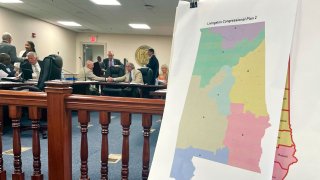
- A panel of three federal judges blocked Alabama from conducting any elections using a congressional map that was accused of being racially gerrymandered against the state's Black voters.
- Finding that it would be "practically impossible" for the state's legislature to fix the map ahead of the 2024 election cycle, the panel ordered a special master and a cartographer to draw up a new one.
- The judges, in a 217-page opinion, also expressed deep concerns about the state's defiance of prior court rulings for them to fix key elements of the congressional map.
A panel of three federal judges on Tuesday struck down an Alabama congressional map accused of being racially gerrymandered against the state's Black voters.
Finding that it would be "practically impossible" for the state's legislature to fix the map ahead of the 2024 election cycle, the panel ordered a special master and a cartographer to draw up a new one.
The judges, in a 217-page opinion, also expressed deep concerns about the state's defiance of prior court rulings for them to fix key elements of the congressional map, a situation that the court described as unprecedented.
"The law requires the creation of an additional district that affords Black Alabamians, like everyone else, a fair and reasonable opportunity to elect candidates of their choice. The 2023 Plan plainly fails to do so," wrote U.S. Circuit Judge Stanley Marcus and U.S. District Judges Anna Manasco and Terry Moorer.
The ruling in U.S. District Court in Alabama is the latest judicial hammer to drop against the Republican-led state legislature, whose prior congressional district map had been struck down by the Supreme Court in June.
Money Report
The conservative-leaning high court, in a surprise 5-4 vote, upheld a lower court ruling that the map violated the 1965 Voting Rights Act.
That lower court had ruled that the state must craft a redistricting plan that includes "either an additional majority-Black congressional district, or an additional district in which Black voters otherwise have an opportunity to elect a representative of their choice."
Feeling out of the loop? We'll catch you up on the Chicago news you need to know. Sign up for the weekly Chicago Catch-Up newsletter.
After the Supreme Court ruling, Alabama asked for a five-week delay to enact a new plan, which the court granted. But in July, the legislature passed, and Republican Gov. Kay Ivey signed, a map that once again included just a single majority-Black district.
Alabama has seven congressional districts, and nearly 27% of its population is Black, according to the 2020 census.
"The State has explained that its position is that notwithstanding our order and the Supreme Court's affirmance, the Legislature was not required to include an additional opportunity district in the 2023 Plan," the judges wrote in Tuesday's opinion.
"That concession controls this case," the judges wrote as they ruled that the latest plan would likely once again violate the voting rights law.
The judge also noted that they have "no reason to believe that allowing the Legislature still another opportunity to draw yet another map will yield a map that includes an additional opportunity district."
"Moreover, counsel for the State has informed the Court that, even if the Court were to grant the Legislature yet another opportunity to draw a map, it would be practically impossible for the Legislature to reconvene and do so in advance of the 2024 election cycle," they wrote.
"Accordingly, the Special Master and cartographer are directed to commence work forthwith on a remedial map," they ruled.
The judges said they were "disturbed" by the evidence that the state sought a delay without attempting to revise its congressional map as the courts had ordered.
"We do not take lightly federal intrusion into a process ordinarily reserved for the State Legislature. But we have now said twice that this Voting Rights Act case is not close," they added. "And we are deeply troubled that the State enacted a map that the State readily admits does not provide the remedy we said federal law requires."






